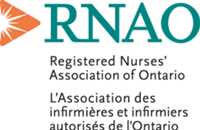Hiring more RNs is crucial if government wants to deliver on its action plan for health
TORONTO, Nov. 25, 2013 /CNW/ - The provincial government will not be able to live up to its promises of a transformed health-care system that meets the diverse care needs of Ontarians without hiring more RNs.
The Registered Nurses' Association of Ontario (RNAO) says the health ministry's much vaunted action plan and its promise "to provide the right care, at the right time, in the right place" simply can't be realized if Ontario's RN-to-population ratio continues to decline.
"Too many registered nurses (RN) across this province are experiencing excessive workloads, and job openings for new grads have dried up," says Rhonda Seidman-Carlson, president of RNAO. Seidman-Carlson says according to RNAO's calculations, 12.9 per cent of newly graduated RNs were unemployed in 2012. A further 4.1 per cent were working outside of nursing and looking for nursing employment.
RNAO says the fact that employment opportunities for RNs have dwindled in recent years should be cause for concern. The association's president says the province took years to recover after the fiasco in the 1990s when nurses headed west and south to the United States to find work. "It is shameful and wasteful to educate registered nurses and then fail to create meaningful opportunities for RNs to work in their chosen profession," says Seidman-Carlson, adding "the evidence that links hours of RN care with better quality patient outcomes and system performance is conclusive."
RNAO says the situation facing the nursing profession in Ontario is particularly unsettling when you compare the province's RN-to-population ratio against other jurisdictions. Data compiled by the Canadian Institute for Health Information confirms the gap that has opened up between Ontario and the rest of the country. The Ontario ratio has been falling steadily in recent years, with 6.99 RNs/1,000 people, compared to the national average of 8.3 RNs/1,000 people.
RNAO says at this rate, the province needs to hire a minimum of 9,000 RNs by 2015 just to catch up, and realistically needs 17,600 more RNs to be in line with the national average.
"RNs play a pivotal role when it comes to delivering health care in this province. A system without enough RNs who have the knowledge and skills to deal with patients with complex care needs and help those requiring expert care in the community is doomed to fail," says Doris Grinspun, RNAO's chief executive officer, adding "how can the province deliver on its promise to improve access to primary care and home care, and live up to its pledge to lower chronic disease rates such as childhood obesity and combat smoking without more RNs?"
RNAO has sent a letter to Premier Wynne and urged its members to write to the premier to press for action.
The Registered Nurses' Association of Ontario (RNAO) is the professional association representing registered nurses wherever they practise in Ontario. Since 1925, RNAO has advocated for healthy public policy, promoted excellence in nursing practice, increased nurses' contribution to shaping the health-care system, and influenced decisions that affect nurses and the public they serve.
For more information about RNAO, visit our website at www.RNAO.ca. You can also check out our Facebook page at www.RNAO.ca/facebook and follow us on Twitter at www.twitter.com/RNAO.
SOURCE: Registered Nurses' Association of Ontario

To book an interview with a nurse, please contact:
Melissa Di Costanzo
Communications Officer/Writer
RNAO
416-408-5606 (office)
[email protected]
Marion Zych
Director of Communications
RNAO
416-408-5605 (office) or 647-406-5605 (cellular)
[email protected]
See the media release on our website.

Share this article